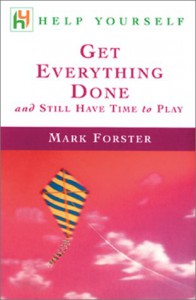Help Yourself Get Everything Done : and Still Have Time to Play
 So, I should admit: self-help books are a guilty pleasure of mine. I'm sure there's many psychological explanations for this attraction, but for now let's just say that I enjoy them, and in particular the sub-genre of time-management self-help. I'm pretty craptastic at managing my time and motivating myself, and reading books like this is probably my way of feeling like I'm making progress whilst actually just putting off dealing with the problem.
So, I should admit: self-help books are a guilty pleasure of mine. I'm sure there's many psychological explanations for this attraction, but for now let's just say that I enjoy them, and in particular the sub-genre of time-management self-help. I'm pretty craptastic at managing my time and motivating myself, and reading books like this is probably my way of feeling like I'm making progress whilst actually just putting off dealing with the problem.All that being said, what did I think of this one?
Mark Forster's writing style was nice, not too patronising nor too pushy. The book laid out some concepts that I believe to be key to time-management (or "life-management"), such as saying no to extra commitments, in an approachable way. The 'fairytale' interludes were a nice touch, and I also liked seeing the examples of how Forster manages his own days in the diary section.
What lets this book down is that it doesn't really do what it says on the cover. Forster specifically states that his book is applicable to anyone, yet it is very much skewed towards business folks. Not only that, but it seems geared especially towards management types, or people running their own businesses, with lots of talk about "projects" and "forward thinking" and so on. There are whole chunks of the book that I felt didn't apply to me. The other aspect I felt let down by was that the subtitle of "and still have time to play" never seemed to be fully addressed. Forster seems to work from the assumption that people fundamentally enjoy their work, and there isn't really much about how to get yourself to do certain tasks day after day that you actually don't take much pleasure in. I suppose there are plenty of self-help books directed at people who don't like their work, but my point is that this book is supposed to be geared towards the general masses, especially those just starting out on dealing with their time-management issues, and as such it should have taken a broader perspective.
Overall, I did pick up one or two new ideas that I'll be giving a try, so I definitely don't think this was a wasted read. The problem is that I believe the book has been marketed towards the wrong audience. Forster mentions that his experience is mainly with helping people manage their businesses, and I have the feeling that that is where his strengths really lie.




